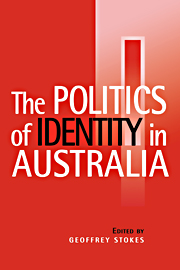Book contents
- Frontmatter
- Contents
- Acknowledgements
- Contributors
- Introduction
- Theorising Identity
- 1 Situating Australian National Identity in Theory and Practice
- 2 ‘Other Times’: Thatcher, Hawke, Keating, and the Politics of Identity
- 3 Universal Obligations: Liberalism, Religion and National Identity
- Gender and Sexuality
- Race, Place and Citizenship
- Culture: Literature and Film
- References
- Index
1 - Situating Australian National Identity in Theory and Practice
Published online by Cambridge University Press: 05 June 2012
- Frontmatter
- Contents
- Acknowledgements
- Contributors
- Introduction
- Theorising Identity
- 1 Situating Australian National Identity in Theory and Practice
- 2 ‘Other Times’: Thatcher, Hawke, Keating, and the Politics of Identity
- 3 Universal Obligations: Liberalism, Religion and National Identity
- Gender and Sexuality
- Race, Place and Citizenship
- Culture: Literature and Film
- References
- Index
Summary
Australians are now confronted with a considerable choice on the menu of national identity. Some of the dishes are presented as the only authentic ones, but there is growing belief that the entire cornucopia lacks authenticity. This chapter canvasses a number of commonly used theoretical distinctions that can frame our understanding of political and historical arguments about identity. These distinctions are then deployed to illuminate both intellectual controversies over Australian identity and recent appeals to national identity in Australian politics. Contrary to the assumptions in much postmodernist thought, it is argued that recourse to collective representations of identity is essential for a politics directed towards alleviating serious social, economic and environmental problems. But contrary to much modernist identity rhetoric, it is argued that these appeals to collective identity need not reproduce the chauvinism or exclusivism of nationalist ideology. Within a careful elaboration of democratic citizenship may be developed a model of a political identity which is both tolerant and inclusive.
Before any discussion is possible about the concrete use of identity in history or national politics, we must first indicate a range of theoretical assumptions about how we may best organise our knowledge about the nature of identity. One way of examining arguments about Australian national identity is to categorise them in terms of the concepts of traditionalism, modernism, postmodernism, and postcolonialism.
- Type
- Chapter
- Information
- The Politics of Identity in Australia , pp. 23 - 36Publisher: Cambridge University PressPrint publication year: 1997
- 3
- Cited by



